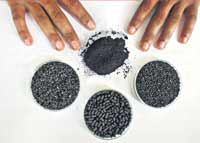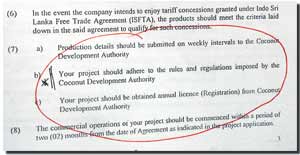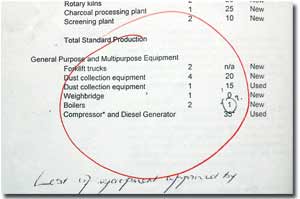| Jacobi says
discrimination against foreign investors
By Natasha Gunaratne
Jacobi Carbons Lanka, a foreign investor
in the eye of a local storm over the use of raw material
for activated carbon manufacture, last week defended
itself against the claims and accused authorities of
being 'unkind' and discriminatory to foreign investors.
Anders Skeini, owner of Jacobi Carbons,
a Swedish company and parent of the Sri Lankan subsidiary,
said it is unfair for Sri Lanka to invite investors,
open its doors and then leave them without raw materials
adding that “it is illegal because investments
should be protected.”
"The government can't make laws
after investments have been approved or the case will
end up in arbitration in Washington on the grounds of
discrimination," he said in an interview last week
noting that laws cannot be imposed retroactively, such
as the Coconut Development Authority (CDA) rules and
regulations on the purchase of raw materials from Sri
Lanka and that they plan on purchasing all of their
raw material locally.
Case
The Sunday Times FT recently reported
the case where the Supreme Court barred Jacobi Carbons
from purchasing raw materials locally for two weeks
on a petition by local activated carbon manufacturer
Prime Carbons saying that the former had violated regulations
by purchasing local raw material. The case comes up
on Friday.
Earlier in December Prime Carbons
filed a fundamental rights case in the Supreme Court.
On the same day, Haycarb Ltd, the biggest activated
carbon maker, filed a writ in the Court of Appeal against
Jacobi. This case is still pending. On the fundamental
rights case, a settlement was agreed upon where Jacobi
Carbons would operate within the rules and regulations
set forth by the CDA.
 |
| Activated carbon |
Accordingly, Jacobi Carbons was to
be barred from purchasing raw materials for its activated
carbon plant. In February 2006, the Supreme Court ordered
these rules and regulations be formulated and gazetted
within six weeks. So far, they have not come into fruition,
allowing Jacobi Carbons to purchase charcoal locally,
causing problems and losses to local manufacturers.
Retracing the steps towards their
investment here, Skeini, now in Colombo, said feasibility
studies on starting his own company in Sri Lanka were
conducted in October 2004 after contract negotiations
with some local companies such as Hayleys Ltd fell through.
Not interested
A Hayleys official, in response, told
The Sunday Times FT that Hayleys was doing marketing
in the US through a company called Barnaby Sutcliffe
which filed for Chapter 11 Bankruptcy in the US. It
was at this time that Skeini contacted Hayleys about
doing marketing for them but officials at Hayleys had
said they were not interested.
Skeini said the Board of Investment
(BOI) was helpful in securing BOI status for manufacturing
capacity of 6000 tonnes of activated carbon and was
able to set up a manufacturing plant in Nattandiya.
Skeini decided to set up in Sri Lanka as opposed to
elsewhere because of the superior quality of the local
coconut shells.
A point of contention for the local
activated carbon industry is the limited availability
of raw materials in Sri Lanka. In fact companies like
Haycarb have imported coconut shells when raw material
was scarce. The local industry feels that the BOI should
never have allowed the entry of a foreign company due
to this reason. However, Jacobi Carbons was granted
BOI status in June 2005 and the CDA issued a letter
of no objection to the BOI but did state the company
would be subject to its rules and regulations.
Saliya Wickremasuriya, former Chairman
of BOI, who handled the Jacobi Carbons application,
said the proposal submitted to the BOI was simply to
import raw material, add value locally and export. "As
such, it should and would have had no effect on local
manufacturers since Jacobi was going to import charcoal
from India," Wickremasuriya said. He added that
at the time, the BOI was contacted by one of the larger
local manufacturers asking them to exercise caution.
"When our officer reviewed the application, it
was based on imported raw material. On that basis, we
gave them approval. We didn't want there to be an adverse
market impact in Sri Lanka since they (Jacobi Carbons)
were going to import their charcoal from India."
According to Wickremasuriya, this matter should be taken
up between Jacobi Carbons and the BOI by scrutinizing
the agreement and application which is part and parcel
of the agreement.
Different wording
According to court documents obtained
by The Sunday Times FT, gazetting of CDA rules and regulations
didn't take place until May 29, 2006, over three months
after the Supreme Court ruling. The wording used by
the CDA in February 2006 is slightly different to what
was gazetted in May. Instead of barring the purchase
of charcoal in Sri Lanka, the CDA said that it will
consider the licence to companies on the availability
of raw material with permission also being granted upon
availability.
 |
| Jacobi being told to observe CDA
rules |
The gazetted regulations were set to
come into effect on August 1, 2006. Why did it take
so long for the CDA to gazette the rules and why did
the CDA delay the rules coming into effect?
Jacobi, through its lawyers in Colombo,
challenged the CDA rules and regulations barring it
from purchasing local raw materials in court.
"Jacobi made a 450 million rupee
investment and they (CDA) made rules to say that only
the foreign company cannot buy coconut here," said
Skeini adding that it is highly discriminatory. On July
3, 2006, Jacobi wrote to the Minister of Trade, Commerce
and Consumer Affairs stating that the "concurrence
of the Minister in charge of Foreign and Internal Trade,"
had not been sought during gazetting as per CDA Act
No. 46 of 1971.
No concurrence
Shouldn't the concurrence of the Minister
have been sought by the CDA when the regulations were
first being formed? CDA officials would not comment
on this issue due to the case pending in the Supreme
Court.
The Minister had sent a letter dated
July 7, 2006 to the CDA, informing them of the oversight
but not stating if he was supporting the regulations
one way or the other. Furthermore, the Minister also
sent a copy of that letter to Jacobi Carbons' legal
representatives. Was this an attempt to make it easier
for Jacobi Carbons to expedite their application to
the Court of Appeal to postpone the gazette notification?
Haycarb officials have stated that they have never received
any response from the CDA or the BOI on inquiries into
this matter.
The application to the BOI stated
that manufacturing capacity for Jacobi Carbons would
be 6000 tonnes with 2 lines (3000 tonnes each), meaning
two rotary kilns and two boilers. A CDA inspection of
their factory uncovered that Jacobi Carbons had installed
five rotary kilns and five boilers. But Skeini says,
the company decided on 5 lines for greater flexibility
even though he maintains that the total output has remained
at 6000 tonnes.
However, use of extra equipment changes
the information listed in the BOI application. For example,
power requirements will not match what was stated in
the original application. When asked if the company
brought any new technology into the country, a requirement
to secure BOI status, Skeini replied that his company
is engaged in certain value addition processes but was
unsure if Haycarb was undertaking them.
Haycarb, in response, said this is
untrue adding that Jacobi Carbons had no manufacturing
experience before setting up factories in Sri Lanka
and therefore, brought no new technology into the country.
Haycarb said Jacobi appointed I.K.
Bede Johnpillai as its local director. Johnpillai was
the head of the security firm Kay Jay Securities that
supplied security staff for Haycarb and has no experience
in this field. "This appointment tends to create
a reasonable suspicion that Jacobi has been and is attempting
to obtain confidential information with regard to Haycarb's
operations and use such information to compete in the
market," Haycarb said in documents filed in its
own case.
When the CDA said they were going
to formulate their rules and regulations, why did Jacobi
Carbons not inquire into what those regulations would
be? Wasn't the CDA established to protect the local
industry and therefore, shouldn't they be allowed to
formulate rules and regulations in order to ensure this?
Asked about the shortage of raw materials
in the country, a complaint voiced by the local activated
carbon industry, Skeini said charcoal availability is
seasonal, this year being a particularly good one.
During shortages of charcoal, Jacobi
Carbons imports the raw material.
Competition good
Skeini said, "The more competition
there is for the raw material, the prices go up and
it is better for the coconut industry." But Hayleys
Group chairman Rajan Yatawara, in a recent letter to
the BOI, says that Jacobi stockpiled and bought more
than a year's supply by paying US$300 per tonne, US$100-150
more than anywhere in the world.
 |
| Extract showing Jacobi had approval
for only 2 boilers whereas it uses 5 boilers |
"The intentions are clear. By
writing off consequent losses in the first year, they
send less strategically funded local competitors to
the wall and retrenchment will be greater than the employment
created.
Having thus gained a monopoly both
of markets and raw materials prices, they can recover
the loss in a year by price dictation on both, moreso
the latter. No profit will be retained in the country,
instead remitted overseas tax free," he said.
He said Sri Lanka exports raw materials
at low cost. "Why doesn't the government stop exporting
raw materials when value addition is somewhere else?"
he questioned. Industry officials say there are only
one or two individuals supplying a limited amount of
charcoal to France, somewhere between 3000 to 5000 tonnes
per year.
A lot of people protested because
instead of sending charcoal in raw form, it can be exported
in a value added form, generating more income to the
country. However, one official said that the amount
being exported does not significantly impact an already
depleted local supply.
Skeini said by blocking Jacobi Carbons
from purchasing charcoal, the government is losing cess
payments from the export of activated carbon. Moreover
he insists there is excellent availability of coconut
shells in Sri Lanka but around half of it goes for domestic
consumption.
D.J.U. Purasinghe, Chairman of the
CDA, said that he is trying his best to resolve this
matter by safeguarding the local industry as well as
the investor.
He added that he needs proper support
from all the manufacturers in order to resolve this
issue. "When we are in a crisis, we should all
get together," he said. According to Purasinghe,
the CDA has started the collection of unutilized shells
for purchase by the industry.
Skeini says he has given the CDA tens
of millions of rupees to start such an initiative even
though the CDA hasn’t taken him up on his offer,
a claim that was denied by Purasinghe saying the CDA
never receieved money from Jacobi Carbon.
"The two parties are fighting
each other so as a corrective method, I will have to
look at the scenario and think of an answer for collecting
unused shells," he said. Local manufacturers have
told the CDA that around 14,000 tonnes of charcoal have
to be imported to supplement the shortage of local supplies.
"For me to resolve this, I must
try my best to collect that amount at least. I have
to be fair in this agenda. I'm very concerned about
the local industry," Purasinghe said.
|
